
test

2 End hunger, achieve food security and improved nutrition and promote sustainable agriculture

goal 3

goal 4

goal 5

goal 6

goal 7

goal 8

goal 9

goal 10

goal 11

goal 12

goal 13

goal 14

goal 15

Goal 16
16.3: Promote the rules of law and the national and international levels and ensure equal access to justice for all.
16.5: Substantially reduce corruption and bribery in all their forms
16.7 Ensure responsive, inclusive, participatory and representative decision-making at all levels
16.b: Promote and enforce non-discriminatory laws and policies for sustainable development

Goal 17
Environmental Management
 |
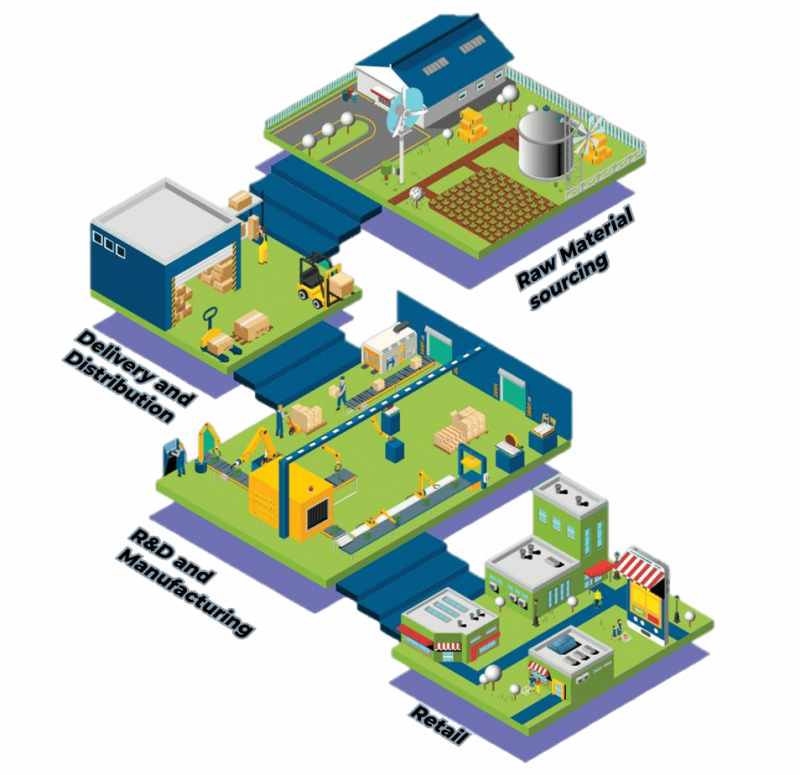 |
 |
|
 |
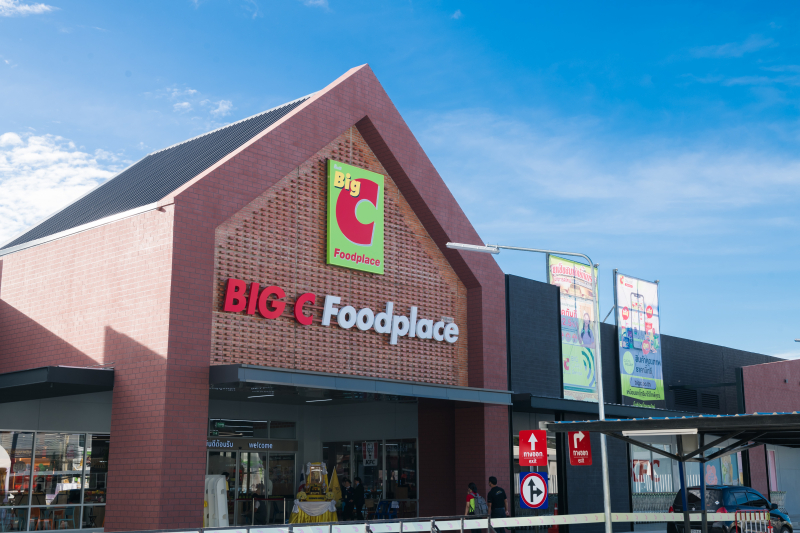 |
||
To safeguard environmental well-being, and achieve the commitment to operate on a principle of sustainable business operations, which takes social and environmental responsibility into consideration throughout the supply chain, BJC is guided by the corporatewide Environmental Policy, which continiously strives to identify and develop new initiatives to minimise negative operational impacts on surorunding environment and communities, and seeks to foster poitive impacts on climate change, society and the environment. The policy encourages BJC to integrate and comply with environmental management standard in accordance with applicable international and domestic standards, laws, and regulations as follow,
- Commitment to Environmental Protection: Refraining from choosing operation site in natural and environment conservation areas as required by law. The areas include World Heritage areas in accordance with the criteria of UNESCO, and protected areas according to The International Union for Conservation of Nature (IUCN) category 1-4.
- Commitment to Create Environmental Awareness: Encouraging awareness and understanding of environment for suppliers, trade partners, service providers, contractors, and business alliances, ensuring that their operations are compiled with environmental regulations and forests and biodiversity responsibility.
- Commitment to implement an environmental management system: BJC has utilized the criteria of ISO 14001 EMS throughout various supply chain, aiming to reduced environmental impact and improve environmental performances throughout the company.
- Commitment to use natural resources or energy more efficiently: Proceed on all business operation with environment and society responsibility by creating innovations to reduce negative impacts on the environment, promoting the sustainable use of natural resources and energy, protecting ecosystem and biodiversity
- Commitment to reduce emissions, releases and waste: Promoting proportion of alternative energy or renewable energy usage such as solar power to reduce the electricity consumption resulting from processes that use natural resources (non-renewable energy) or the process that produces greenhouse gases.
- Commitment to monitor the company's environmental performance: Continuously support monitoring, assessment, and improvement of 1) environmental management 2) impacts on climate change 3) forests and biodiversity, in production processes, transportation and services.
- Commitment to report regularly on environmental issues: continuously assess, identify and report environmental issues material to BJC's operations, along with implemented mitigation strategies and programs to remediate negative effects.
- Commitment to consult with stakeholders on environmental issues: BJC has consulted both internal and external stakeholders in the development and implementation of a comprehensive Environmental Management Policy that ensures compliance with all relevant laws, regulations, and standards including ISO 14001 certifications.
Environmental Risk Management
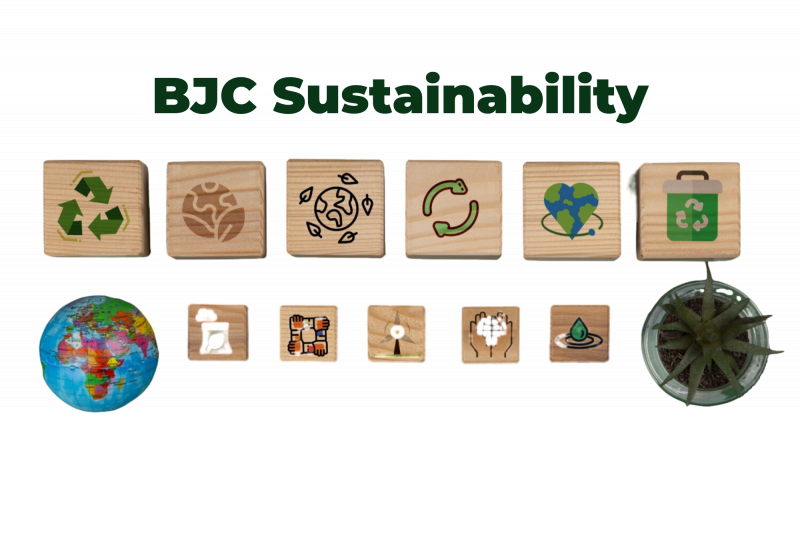
Through BJC's continued transition towards a sustainable operation, BJC have since incorporated environmental-related risk and opportunities, material environmental, social and governance (ESG) or sustainability risks assessment as one of the five key risk categories assessed quarterly, conducted with relevant internal and external business units. Results of the quarterly risk assessments are used by each relevant business units to develop and implement new ESG-oriented initiatives, developed to reduce negative impacts from operations. This also serves as a channel for BJC to train and inform employees about environmental management systems, increasing their capabilities and knowlegde about available environmental management systems. Furthermore, to safeguard that all information consolidated and disclosed publicly are accurate, relevant data are audited by applicable internal and external auditors at each facilities to assure that the data are accurate. Information consolidated through the internal and external audits are utilized by senior management of each respective business units to identify, develop and implement corrective and improvement strategies in order to stimulate continual improvements throughout the organization.
BJC Sustainability Taxonomy
A Taxonomy is a framework which provides a clear definitions of business activities, that can be considered benefitial to social and the environment. The framework may be legally enforced by relevant financial regulations within the company operating juridiction, or are voluntary framework the company has decided to comply with, enabling the company to set a common definition of economic activities which can be considered environmentally sustainable.
In 2024,Thailand taxonomy has recently been released and is currently applicable only to the Energy and Transport sectors; the sustainable framework is not yet legally required in Thailand. Since BJC operates in the food and staple retailing sector, this requirement is not directly applicable to the company. Nevertheless, BJC voluntarily discloses its taxonomy eligibility in accordance with Thailand Taxonomy Phase 1 to prepare for foreseeable future enforcement.
Activity-level breakdown of eligibility and alignment
The company’s eligible and alignment activities under the Thailand Taxonomy include:
-
Installation of Solar PV systems
-
Transportation using electric vehicles
In 2024, the BJC Sustainability Taxonomy is summarized in the below:
Taxonomy Aggregate Mapping
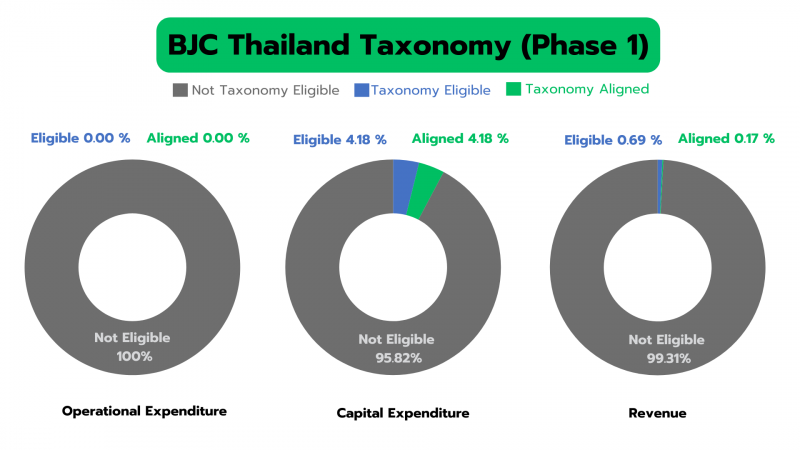
Sustainability Day 2024
The annual sustainability day #3 was held on August 28, 2024 at BJC House, the headquarter of BJC Big C. The event was attended by members of the Board of Directors, the Chief Executive Officer and President of BJC Group, Mr. Aswin Techajareonvikul, Mr. Tevin Vongvanich along with other top senior executives and representatives of each supply chains and business units, and serves as a channel for representative of each supply chain to present, share, and discuss climate-related knowledge and implemented initiatives for the reporting year.
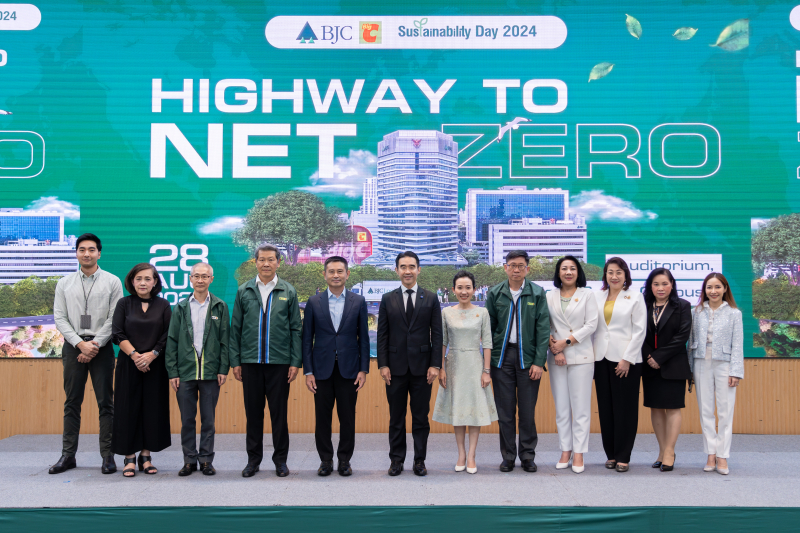
The event was well received by all participants, whom gain a better understanding and awareness about the need to transition BJC Group’s Operations towards sustainability, in addition to knowledge about implemented initiatives which contributed to BJC Group to be Net Zero by 2050.